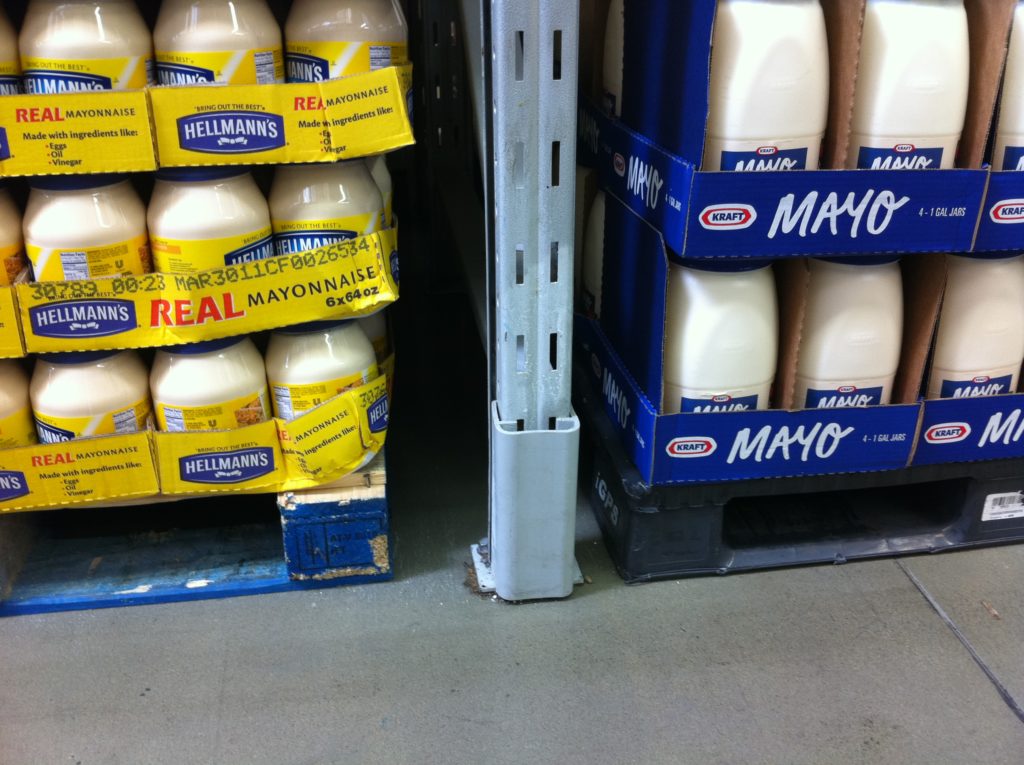Dollar Tree Pallet Requirements
Dollar Tree is one of the biggest discount merchandisers in the United States, with over 15,000 stores. The chain offers a selection of basic groceries as well as household items like cleaning supplies, automotive products, clothing, and kitchenware. Consumer goods manufacturers who are looking to make their products as widely available as possible by partnering with this chain will want to be familiar with Dollar Tree pallet requirements.

General Dollar Tree Pallet Requirements
Dollar Tree, like nearly all stores that sell groceries, requires a 48-by-40 Consumer Brands Association (CBA) pallet (formerly GMA). Dollar Tree also specifies that this should be a Grade A pallet.
Dollar Tree requires pallets to meet the criteria below. Suppliers are encouraged to confirm this information directly with Dollar Tree to ensure it includes the latest updates.
- The pallet should have 3 stringers that are in good condition. Good condition, in this case, means unblocked, or not having been repaired with additional wood.
- Between 7 and 9 top deck boards should be present on the pallet. These should be no less than ½ inch thick and no more than ⅝ inches thick.
- Between 3 and 5 bottom deck boards should be present on the pallet and these can range from ½ inch to ⅝ inch in thickness. Bottom deck boards that are ¾ of an inch in thickness are also occasionally permissible.
While Dollar Tree’s pallet requirements don’t make it explicitly clear that top and bottom deck boards must not be broken or that fasteners must not be emerging above the surface of the wood, the chain does request Grade A pallets, which should not need or have had repairs and should have all nails flush with the surface of the wood. Plastic shipping pallets can easily meet—and even exceed—these pallet requirements.

Plastic Pallets Exceed Dollar Tree’s Pallet Specifications
Wood pallets have a raft of issues aside from the ones mentioned in Dollar Tree’s pallet requirements. The nails that hold wood pallets together are known to work their way loose over time, which leads to loose and missing boards. Loose nails can also contribute to the breakage of pallet boards when the weight of the load and a greater range of movement increase stress on portions of the pallet.
Plastic pallets have a unitized design that doesn’t use fasteners. This means they have no individual boards that can be broken. Plastic pallets don’t have stringers that can be damaged and require patching or bracing. Strong, unibody plastic pallets are rated for heavy loads and are difficult to damage during transportation and handling.
| Moisture Resistant | Plastic pallets do not absorb moisture, which means their weight is fixed. The weight of wood pallets, on the other hand, changes according to the moisture they absorb from the surrounding environment. |
| Hygienic Surface | Since plastic doesn’t absorb liquids and plastic pallets can easily be rinsed or wiped off, plastic pallets are at lower risk of transferring contaminants from one location in the supply chain to another. |
| Reduced Debris | Plastic pallets don’t produce splinters, dust, or nails that can dirty warehouses, distribution centers, and shipping containers in the supply chain. |
| Durability | A stringer pallet can make three to five trips through the supply chain before it needs repair or replacement, while a plastic pallet can make over a hundred trips, after which it can be recycled into a “new” pallet. |
| Lightweight Construction | High-quality plastic pallets weigh around 50 pounds. This light weight ensures that trucks are able to carry more products in each trip, lowering greenhouse gas emissions and transport costs. |
While Dollar Tree pallet requirements offer a significant amount of leeway in what pallets their vendors choose to use, lightweight pooled plastic pallets are the obvious choice for suppliers looking to increase their efficiency, lower product damage, and save on total costs. iGPS plastic rental pallets allow vendors to safely ship products of all kinds to grocery and general stores across North America.